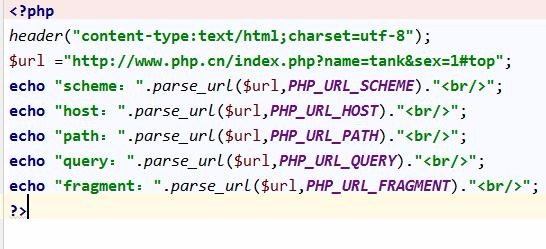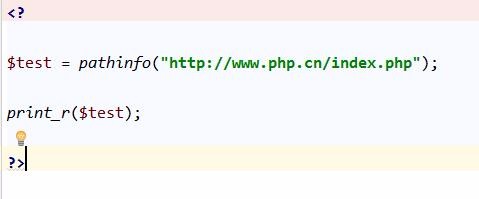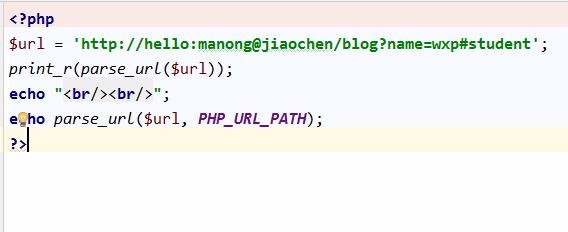10 recommended courses about parse_url()
There are two functions for parsing URLs in PHP, namely the parse_str() function and the parse_url() function. The parse_str function parses the query string into a variable, and the parse_url function is used to parse the entire URL and return its components. Part, the previous article also explained these two functions respectively. This article mainly introduces the usage and difference between the two functions of php parse_str() function and parse_url() function when parsing URLs. First look at the php parse_str function. The php parse_str function parses the query string into variables. The parse_str function has two parameters. The first parameter is the query string that needs to be parsed and is required. The second parameter is used to set the variable that receives the parsed query string. The second parameter is optional. Please see the following example: Here we use parse_url to obtain the query string of the URL. The parse_url function is explained below.
1. Detailed introduction to parse_str()

##Introduction: There are two functions for parsing URLs in PHP, namely the parse_str() function and the parse_url() function. The parse_str function parses the query string into a variable, parse_url The function is used to parse the entire URL and return its components. The previous article also explained these two functions respectively. This article mainly introduces the php parse_str() function and parse_url() function when parsing the URL. usage and differences. First look at php par...
##2.php parse_url() function summary of URL usage

3.
The difference between the php parse_str() function and the parse_url() function to parse URLs

4.
Explanation on using php pathinfo(), parse_url(), basename() functions to parse URLs

5.
Detailed explanation of php parse_url () function definition and usage
 ##Introduction: What is the role of the php parse_url() function? The parse_url() function in php parses the URL and returns the components of the URL. Its syntax is as follows:
##Introduction: What is the role of the php parse_url() function? The parse_url() function in php parses the URL and returns the components of the URL. Its syntax is as follows:
6.
php uses the functions pathinfo(), parse_url() and basename() to parse the URL_php instanceIntroduction: As we all know, the functions pathinfo(), parse_url() and basename() in PHP are all functions for parsing URLs, but there are some differences. Here are some examples, which are easier to understand through examples. Friends in need can refer to the usage methods and techniques of these three functions. Friends who are interested can learn together below.
7. The implementation code of using parse_url to parse the URL in php Detailed explanation of parse_url
Introduction:: Using parse_url in php to parse the URL Detailed explanation of the implementation code of parse_url: PHP parsing URL function: parse_url Detailed explanation parse_url - parses the URL and returns its component description array parse_url (string $url) This function parses a URL and returns an associative array, containing various components that appear in the URL part. This function is not used to verify the validity of the given URL, only to break it into the parts listed below. Incomplete URLs are also accepted, and parse_url() will try to be as correct as possible
8. Detailed explanation of PHP functions: parse_url()
Introduction: Detailed explanation of PHP function: parse_url()
Introduction: Implementation code for using parse_url() in PHP to parse URLs (detailed explanation of parse_url). PHP parsing URL function: parse_url detailed explanation parse_url - parses the URL and returns an array of descriptions of its components parse_url (string $url) This function parses a URL and returns an associative array,
10. Introduction to the usage of the parse_url() function in php
Introduction: Introduction to the usage of the parse_url() function in php. This article introduces the usage of parse_url() function in PHP. Friends who need to use parse_url() function can refer to this article. A useful function parse_url in PHP, especially convenient
The above is the detailed content of 10 recommended courses about parse_url(). For more information, please follow other related articles on the PHP Chinese website!

Hot AI Tools

Undresser.AI Undress
AI-powered app for creating realistic nude photos

AI Clothes Remover
Online AI tool for removing clothes from photos.

Undress AI Tool
Undress images for free

Clothoff.io
AI clothes remover

Video Face Swap
Swap faces in any video effortlessly with our completely free AI face swap tool!

Hot Article

Hot Tools

Notepad++7.3.1
Easy-to-use and free code editor

SublimeText3 Chinese version
Chinese version, very easy to use

Zend Studio 13.0.1
Powerful PHP integrated development environment

Dreamweaver CS6
Visual web development tools

SublimeText3 Mac version
God-level code editing software (SublimeText3)

Hot Topics
 1666
1666
 14
14
 1425
1425
 52
52
 1327
1327
 25
25
 1273
1273
 29
29
 1252
1252
 24
24
 Explain secure password hashing in PHP (e.g., password_hash, password_verify). Why not use MD5 or SHA1?
Apr 17, 2025 am 12:06 AM
Explain secure password hashing in PHP (e.g., password_hash, password_verify). Why not use MD5 or SHA1?
Apr 17, 2025 am 12:06 AM
In PHP, password_hash and password_verify functions should be used to implement secure password hashing, and MD5 or SHA1 should not be used. 1) password_hash generates a hash containing salt values to enhance security. 2) Password_verify verify password and ensure security by comparing hash values. 3) MD5 and SHA1 are vulnerable and lack salt values, and are not suitable for modern password security.
 PHP and Python: Comparing Two Popular Programming Languages
Apr 14, 2025 am 12:13 AM
PHP and Python: Comparing Two Popular Programming Languages
Apr 14, 2025 am 12:13 AM
PHP and Python each have their own advantages, and choose according to project requirements. 1.PHP is suitable for web development, especially for rapid development and maintenance of websites. 2. Python is suitable for data science, machine learning and artificial intelligence, with concise syntax and suitable for beginners.
 PHP in Action: Real-World Examples and Applications
Apr 14, 2025 am 12:19 AM
PHP in Action: Real-World Examples and Applications
Apr 14, 2025 am 12:19 AM
PHP is widely used in e-commerce, content management systems and API development. 1) E-commerce: used for shopping cart function and payment processing. 2) Content management system: used for dynamic content generation and user management. 3) API development: used for RESTful API development and API security. Through performance optimization and best practices, the efficiency and maintainability of PHP applications are improved.
 PHP: A Key Language for Web Development
Apr 13, 2025 am 12:08 AM
PHP: A Key Language for Web Development
Apr 13, 2025 am 12:08 AM
PHP is a scripting language widely used on the server side, especially suitable for web development. 1.PHP can embed HTML, process HTTP requests and responses, and supports a variety of databases. 2.PHP is used to generate dynamic web content, process form data, access databases, etc., with strong community support and open source resources. 3. PHP is an interpreted language, and the execution process includes lexical analysis, grammatical analysis, compilation and execution. 4.PHP can be combined with MySQL for advanced applications such as user registration systems. 5. When debugging PHP, you can use functions such as error_reporting() and var_dump(). 6. Optimize PHP code to use caching mechanisms, optimize database queries and use built-in functions. 7
 How does PHP type hinting work, including scalar types, return types, union types, and nullable types?
Apr 17, 2025 am 12:25 AM
How does PHP type hinting work, including scalar types, return types, union types, and nullable types?
Apr 17, 2025 am 12:25 AM
PHP type prompts to improve code quality and readability. 1) Scalar type tips: Since PHP7.0, basic data types are allowed to be specified in function parameters, such as int, float, etc. 2) Return type prompt: Ensure the consistency of the function return value type. 3) Union type prompt: Since PHP8.0, multiple types are allowed to be specified in function parameters or return values. 4) Nullable type prompt: Allows to include null values and handle functions that may return null values.
 The Enduring Relevance of PHP: Is It Still Alive?
Apr 14, 2025 am 12:12 AM
The Enduring Relevance of PHP: Is It Still Alive?
Apr 14, 2025 am 12:12 AM
PHP is still dynamic and still occupies an important position in the field of modern programming. 1) PHP's simplicity and powerful community support make it widely used in web development; 2) Its flexibility and stability make it outstanding in handling web forms, database operations and file processing; 3) PHP is constantly evolving and optimizing, suitable for beginners and experienced developers.
 PHP and Python: Code Examples and Comparison
Apr 15, 2025 am 12:07 AM
PHP and Python: Code Examples and Comparison
Apr 15, 2025 am 12:07 AM
PHP and Python have their own advantages and disadvantages, and the choice depends on project needs and personal preferences. 1.PHP is suitable for rapid development and maintenance of large-scale web applications. 2. Python dominates the field of data science and machine learning.
 PHP vs. Other Languages: A Comparison
Apr 13, 2025 am 12:19 AM
PHP vs. Other Languages: A Comparison
Apr 13, 2025 am 12:19 AM
PHP is suitable for web development, especially in rapid development and processing dynamic content, but is not good at data science and enterprise-level applications. Compared with Python, PHP has more advantages in web development, but is not as good as Python in the field of data science; compared with Java, PHP performs worse in enterprise-level applications, but is more flexible in web development; compared with JavaScript, PHP is more concise in back-end development, but is not as good as JavaScript in front-end development.




